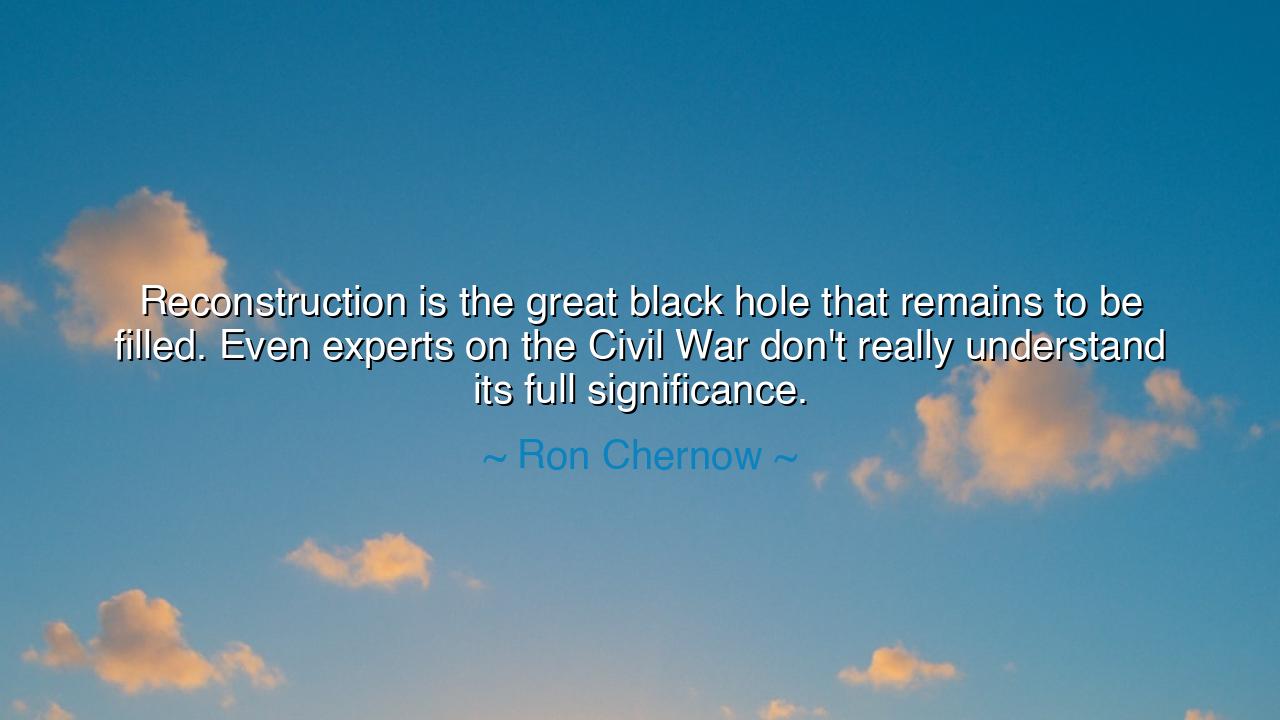
Reconstruction is the great black hole that remains to be filled.
Reconstruction is the great black hole that remains to be filled. Even experts on the Civil War don't really understand its full significance.






When Ron Chernow declared, “Reconstruction is the great black hole that remains to be filled. Even experts on the Civil War don't really understand its full significance,” he spoke as a historian who had stared into the heart of America’s most unfinished story. His words carry both sorrow and challenge — a call to remembrance, and to reckoning. For the era of Reconstruction, that turbulent dawn after the Civil War, stands as one of the most misunderstood and neglected chapters in the nation’s moral journey. It was a time when the United States, victorious in battle, faced a far greater trial: the rebuilding of its soul.
In those years between 1865 and 1877, the country stood at a crossroads. The chains of slavery had been broken, but freedom without justice is a fragile victory. Millions of newly freed men and women stepped into the light of emancipation, only to find that the path ahead was strewn with betrayal and resistance. The Union that had triumphed over secession now struggled to define what equality truly meant. To Chernow, this era is a “black hole” — not merely because it is dark or forgotten, but because it is a place where understanding collapses under the weight of complexity, where history itself bends and vanishes, leaving silence where truth should echo.
Chernow, whose pen has resurrected figures like Alexander Hamilton, George Washington, and Ulysses S. Grant, knows well the pulse of human greatness and failure. When he calls Reconstruction a black hole, he means that even those who study the Civil War — with its blood and valor, its famous battles and generals — often overlook the greater struggle that followed. For while war tests courage, reconstruction tests conscience. It is one thing to end bondage; it is another to build equality. It is one thing to defeat an army; it is another to heal a nation’s heart. The battles fought after Appomattox — in courts, legislatures, and small towns — were quieter, but no less decisive for the destiny of America.
Consider the story of Frederick Douglass, who, after the war, stood as both witness and prophet. He warned the nation that the work of freedom was not yet done. “Slavery is not abolished,” he said, “until the black man has the ballot.” And yet, as the years passed, the promise of Reconstruction — of land, of education, of equal rights — was systematically undone. The Ku Klux Klan rose like a shadow from the ashes of defeat; laws were twisted to reforge chains in subtler forms. Douglass watched the tide turn and lamented that the “revolution of 1863” had been betrayed by the cowardice of 1877. His life reminds us that history is not measured only in victories won, but in opportunities lost through fear and fatigue.
Chernow’s lament is not simply about history — it is about memory. For to forget Reconstruction is to misunderstand the roots of the present. The struggles for civil rights, the wounds of racial division, the questions of justice and belonging that still haunt the nation — all trace their lineage to that unfinished chapter. It is a “black hole” not because it has vanished, but because it still pulls at us, silently shaping our world. The light of truth cannot escape it unless we face it with courage, honesty, and humility.
From this truth arises a lesson that echoes through time: a nation, like a person, cannot be healed by denial. The ancients taught that what is buried in darkness must one day be brought into light, or it will fester and poison the soul. So it is with Reconstruction. It demands that we look unflinchingly at our past — not with shame alone, but with the determination to complete what was left undone. As Chernow implies, understanding this era is not an act of scholarship alone; it is an act of moral repair.
Therefore, my child, take heed of this teaching: to study the past is to heal the future. Seek out the silenced voices — the freedmen who built schools and churches from nothing, the women who taught beneath leaking roofs, the soldiers who defended liberty in the Reconstruction South and were forgotten. Learn their names. Tell their stories. For only when the “black hole” of Reconstruction is filled with truth and remembrance will the nation’s history become whole. The curtain of forgetfulness must be lifted, and the light of understanding must enter. Then, at last, the great unfinished work of freedom will move forward — not as an echo of what might have been, but as a living promise fulfilled.






AAdministratorAdministrator
Welcome, honored guests. Please leave a comment, we will respond soon